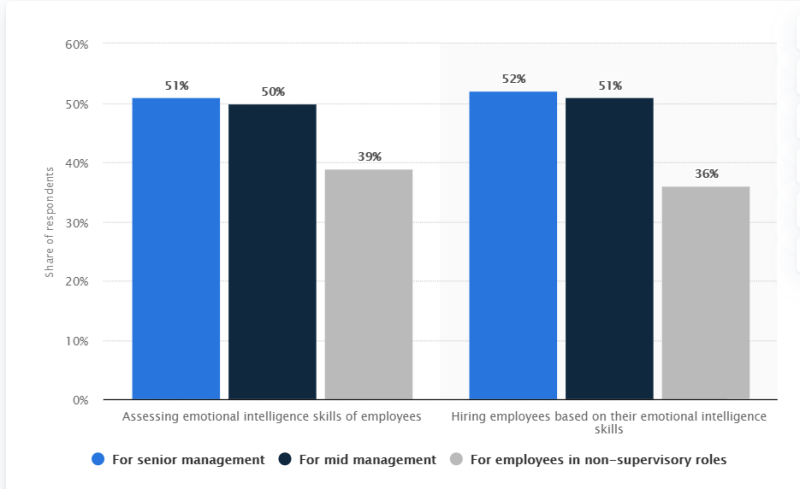Emotion vs. Reason in the Workplace is a delicate subject as most of you already know. If you have entered the work environment, you have most likely encountered situations in which you were moved by emotion, and others in which you were moved by reason.
What happens is that multiple people believe emotion should not have a place in the workforce, and therefore, tend to only use reason for every step of the way. What if I told you, both are important when it comes to pursuing a career in Europe? Would you believe me?
1. Emotion:
According to the Merriam-Webster Dictionary, emotion is “a conscious mental reaction (such as anger or fear) subjectively experienced as strong feeling usually directed toward a specific object and typically accompanied by physiological and behavior changes in the body.”
In addition, emotion could also be an unconscious reaction to internal or external factors, which we will analyze during this article.
2. Reason:
According to the Oxford Dictionary on Lexico, reason is “a cause, explanation, or justification for an action or event… (it is) to think, understand, and form judgements logically.”
3. Emotion vs. Reason:
It is fair to say that emotion overall has a more immediate effect on our body and judgment than reason. However, after years of experience and practice, one can learn to manage emotions and combine them with reason before applying it to actions. In other words, emotion usually comes before reason as a natural reaction, typical of all human beings.
Unfortunately, there is a strong collective misconception in the way emotion is perceived by society, but especially by the corporate world. Why is that? Some argue traditionalism and patriarchy play an important role in this way of thinking. What are your thoughts? What could be other causes for these misconstructions? Let us know in the comment section below.
Reason has been seen as more valuable and important than reason for thousands of years. However, how does one explain most wars that took place in history? It sure started as an effect of emotion.
What about incredible paintings, such as Brigitte Bardot painted by Antonio Saura in 1959 or The Starry Night by Vincent Van Gogh in 1889? They were all firstly encouraged by emotion and then came down to reason when the artist had to choose the colors and shapes, no?
It is important to quickly correct this misconception for a more developed future in the work environment and in society as a whole. Neither emotion nor reason is better or worse than the other. Both should be considered very important and valuable assets in the workplace and both are deeply connected with work ethic, morality, decision-making, gut feeling, and common sense.
Both emotion and reason interact, and because of those interactions, we are human beings and not primitive animals. Let’s embrace our traits, and understand the importance and value of both in the workplace in Europe.
4. Emotion in the Workplace
As emotions in the workplace are already perceived as detrimental, it is essential to learn how to manage them. However, bear in mind that there is not a specific formula to do so, as we are all unique and should know our own ways.
Managing our emotions makes us emotionally intelligent, and it allows us to use what we feel to our advantage or disadvantage.
Pros of Emotions in the Workplace:
-
It activates our gut feeling, which if mastered, can lead to successful business deals.
-
It motivates us to want to do better, to work harder, and to come in to work everyday.
-
It shows us how passionate we are about what we do, such as helping others, teamwork, etc.
-
It tells us when it is time to change a job or career and pursue a dream and new goals.
-
If combined with reason, it can lead to extraordinary ideas, such as those made by our CEOs.
Cons of Emotions in the Workplace:
-
It can cause impulsive decision-making, which at times is not ideal.
-
It can lead to detrimental physical/verbal behavior.
-
It can be seen as childish by coworkers and bosses if not controlled.
Overall, companies were created with a goal, a purpose, or a passion & usually to help people and make this world better. Therefore, without emotions, work would be meaningless.
5. Reason in the Workplace
For thousands of years, reason has been viewed as a valuable leadership skill/trait to have in the corporate world. Why? For a fair point.
As the definition even says, “reason is to think, understand, and form judgements logically,”. In other words, it is to apply experiences and learning processes to come up with an end response.
Obviously, this is essential in pursuing a career and becoming successful at anything you do. However, reason can also be based on gut feelings, and that’s when emotion & reason tend to interact.
Example: Imagine you’re supposed to make a decision in the next 30 minutes that will impact your entire company and you have a feeling in your stomach that you cannot put into words, but that added to your current knowledge and experiences, make you more certain of which decision to make.
Does this situation sound familiar to you?
It is all about decision-making, problem-solving, and the allowance of the interaction between emotion and reason.
Pros of Reason in the Workplace:
-
It allows a clearer view of things.
-
It uses your experiences - decision-making.
-
It requires a thought process, combined with logic, ethics, and common sense.
-
It can be discussed with your team/department.
Cons of Reason in the Workplace:
-
Using only reason can make you choose an unethical path (at times, emotion brings us back to morality).
6. Survey
According to a 2019 survey, Statista shows that “52% of organizations employ their senior management based on their emotional intelligence skills.” Now, you might be asking yourself: “Why is that?”
Top companies choose leaders that have learned to master their emotions, instead of neglecting them. This allows a successful department and organization as a unit. In addition, Statista used the word interpersonal coordination to describe how an emotionally intelligent person improves the quality of their daily routine.
7. Conclusion:
With the information provided above, one could come to the conclusion that extremes are not the best way to go when speaking of emotion vs. reason in the workplace. As both naturally interact, it leads us to understand that both are natural human being behaviors and body (mental & physical) reactions.
Perhaps, some of you have had experiences in which you had to use either emotion or reason, or maybe even both in your company… tell us your story in the comment section below!
We hope you enjoyed learning more about the misconceptions and the importance of emotions and reason in the workplace.
Feeling inspired? Visit our blog for more career advice! How can you be sure the information we provide is top-notch? We are a group of professionals working with recruiters, career coaches, and HR specialists from all over the world!
Trust our experience and let us help you find a new job in Europe!








Anderson Jes1y ago
Awesomw article.
Awesomw article.